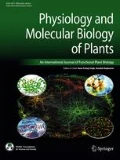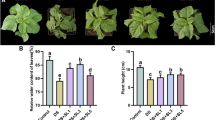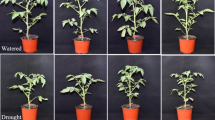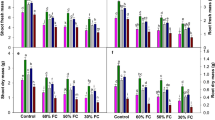Abstract
Tomato is a major cultivated vegetable species of great economic importance throughout the world, but its fruit yield is severely impaired by drought stress. PopW, a harpin protein from Ralstonia solanacearum ZJ3721, plays vital roles in various plant defence responses and growth. In this study, we observed that the foliar application of PopW increased tomato drought tolerance. Our results showed that compared with water-treated plants, PopW-treated plants presented a significantly higher recovery rate and leaf relative water content under drought-stress conditions. PopW decreased the malondialdehyde content and relative electrical conductivity by 40.2% and 21%, respectively. Drought disrupts redox homeostasis through the excessive accumulation of reactive oxygen species (ROS). PopW-treated plants displayed an obvious reduction in ROS accumulation due to enhanced activities of the antioxidant enzyme catalase, superoxide dismutase and peroxidase. Moreover, PopW promoted early stomatal closure, thereby minimizing the water loss rate of plants under drought stress. Further investigation revealed that endogenous abscisic acid (ABA) levels and the transcript levels of drought-responsive genes involved in ABA signal transduction pathways increased in response to PopW. These results confirm that PopW increases drought tolerance through multiple mechanisms involving an enhanced water-retention capacity, balanced redox homeostasis, increased osmotic adjustment, reduced membrane damage and decreased stomatal aperture, suggesting that the application of exogenous PopW may be a potential method to enhance tomato drought tolerance.







Similar content being viewed by others
References
Alscher RG, Erturk N, Heath LS (2002) Role of superoxide dismutases (SODs) in controlling oxidative stress in plants. J Exp Bot 53:1331–1341. https://doi.org/10.1093/jxb/53.372.1331
Ashraf M, Iram A (2005) Drought stress induced changes in some organic substances in nodules and other plant parts of two potential legumes differing in salt tolerance. Flora 200:535–546. https://doi.org/10.1016/j.flora.2005.06.005
Balazadeh S, Riaño-Pachón DM, Mueller-Roeber B (2008) Transcription factors regulating leaf senescence in Arabidopsis thaliana. Plant Biol 10(Suppl 1):63–75. https://doi.org/10.1111/j.1438-8677.2008.00088.x
Barrs HD, Weatherley PE (1962) A re-examination of the relative turgidity technique for estimating water deficits in leaves. A J Biol Sci 15:413–428. https://doi.org/10.1071/BI9620413
Bates LS, Waldren RP, Teare ID (1973) Rapid determination of free proline for water-stress studies. Plant Soil 39:205–207. https://doi.org/10.1007/BF00018060
Bernardo L, Morcia C, Carletti P, Ghizzoni R, Badeck FW, Rizza F, Lucini L, Terzi V (2017) Proteomic insight into the mitigation of wheat root drought stress by arbuscular mycorrhizae. J Proteom 169:21–32. https://doi.org/10.1016/j.jprot.2017.03.024
Chen L, Qian J, Qu SP, Long J, Yin Q, Zhang CL, Wu XJ, Sun F, Wu TQ, Hayes M, Beer SV, Dong HS (2008) Identification of specific fragments of HpaGXooc, a harpin from Xanthomonas oryzae pv. oryzicola, that induce disease resistance and enhance growth in plants. Phytopathology 98:781–791. https://doi.org/10.1094/PHYTO-98-7-0781
Choi JY, Seo YS, Kim SJ, Kim WT, Shin JS (2011) Constitutive expression of CaXTH3, a hot pepper xyloglucan endotransglucosylase/hydrolase, enhanced tolerance to salt and drought stresses without phenotypic defects in tomato plants (Solanum lycopersicum cv. Dotaerang). Plant Cell Rep 30:867–877. https://doi.org/10.1007/s00299-010-0989-3
Choi MS, Kim W, Lee C, Oh CS (2013) Harpins, multifunctional proteins secreted by gram-negative plant-pathogenic bacteria. MPMI 26:1115–1122. https://doi.org/10.1094/MPMI-02-13-0050-CR
Cui G, Zhao X, Liu S, Sun F, Zhang C, Xi Y (2017) Beneficial effects of melatonin in overcoming drought stress in wheat seedlings. Plant Physiol Biochem 118:138–149. https://doi.org/10.1016/j.plaphy.2017.06.014
Dong HP, Yu HQ, Bao ZL, Guo XJ, Peng JL, Yao Z, Chen GY, Qu SP, Dong HS (2005) The ABI2-dependent abscisic acid signalling controls HrpN-induced drought tolerance in Arabidopsis. Planta 221:313–327. https://doi.org/10.1007/s00425-004-1444-x
Dzung NA, Khanh VTP, Dzung TT (2011) Research on impact of chitosan oligomers on biophysical characteristics, growth, development and drought resistance of coffee. Carbohydr Polym 84:751–755. https://doi.org/10.1016/j.carbpol.2010.07.066
Farooq M, Wahid A, Kobayashi N, Fujita D, Basra SMA (2009) Plant drought stress: effects, mechanisms and management. Agron Sustain Dev 29:185–212. https://doi.org/10.1051/agro:2008021
Fujii H, Chinnusamy V, Rodrigues A, Rubio S, Antoni R, Park S-Y, Cutler SR, Sheen J, Rodriguez PL, Zhu JK (2009) In vitro reconstitution of an abscisic acid signalling pathway. Nature 462:660–664. https://doi.org/10.1038/nature08599
Hameed A, Bibi N, Akhter J, Iqbal N (2011) Differential changes in antioxidants, proteases, and lipid peroxidation in flag leaves of wheat genotypes under different levels of water deficit conditions. Plant Physiol Biochem 49:178–185. https://doi.org/10.1016/j.plaphy.2010.11.009
Hanin M, Brini F, Ebel C, Toda Y, Takeda S, Masmoudi K (2011) Plant dehydrins and stress tolerance: versatile proteins for complex mechanisms. Plant Signal Behav 6:1503–1509. https://doi.org/10.4161/psb.6.10.17088
Heath RL, Packer L (1968) Photoperoxidation in isolated chloroplasts: I. Kinetics and stoichiometry of fatty acid peroxidation. Arch Biochem Biophys 125:189–198. https://doi.org/10.1016/0003-9861(68)90654-1
Hsieh TH, Li CW, Su RC, Cheng CP, Sanjaya TYC, Chan MT (2010) A tomato bZIP transcription factor, SlAREB, is involved in water deficit and salt stress response. Planta 231:1459–1473. https://doi.org/10.1007/s00425-010-1147-4
Hu W, Huang C, Deng X, Zhou S, Chen LH, Li Y, Wang C, Ma Z, Yuan QQ, Wang Y, Cai R, Liang XY, Yang GX, He GY (2013) TaASR1, a transcription factor gene in wheat, confers drought stress tolerance in transgenic tobacco. Plant Cell Environ 36:1449–1464. https://doi.org/10.1111/pce.12074
Hua ZM, Yang X, Fromm ME (2006) Activation of the NaCl- and drought-induced RD29A and RD29B promoters by constitutively active Arabidopsis MAPKK or MAPK proteins. Plant Cell Environ 29:1761–1770. https://doi.org/10.1111/j.1365-3040.2006.01552.x
Hussain M, Farooq S, Hasan W, Ul-Allah S, Tanveer M, Farooq M, Nawaz A (2018) Drought stress in sunflower: Physiological effects and its management through breeding and agronomic alternatives. Agr Water Manage 201:152–166. https://doi.org/10.1016/j.agwat.2018.01.028
Khokon AR, Okuma E, Hossain MA, Munemasa S, Uraji M, Nakamura Y, Mori IC, Murata Y (2011) Involvement of extracellular oxidative burst in salicylic acid-induced stomatal closure in Arabidopsis. Plant Cell Environ 34:434–443. https://doi.org/10.1111/j.1365-3040.2010.02253.x
Lamb C, Dixon RA (1997) The oxidative burst in plant disease resistance. Annu Rev Plant Phys 48:251–275. https://doi.org/10.1146/annurev.arplant.48.1.251
Landi S, Nurcato R, De Lillo A, Lentini M, Grillo S, Esposito S (2016) Glucose-6-phosphate dehydrogenase plays a central role in the response of tomato (Solanum lycopersicum) plants to short and long-term drought. Plant Physiol Biochem 105:79–89. https://doi.org/10.1016/j.plaphy.2016.04.013
Lee SC, Luan S (2012) ABA signal transduction at the crossroad of biotic and abiotic stress responses. Plant Cell Environ 35:53–60. https://doi.org/10.1111/j.1365-3040,2011.02426.x
Li JG, Cao J, Sun FF, Niu DD, Yan F, Liu HX, Guo JH (2011) Control of Tobacco mosaic virus by PopW as a result of induced resistance in tobacco under greenhouse and field conditions. Phytopathology 101:1202–1208. https://doi.org/10.1094/PHYTO-02-11-0049
Li JG, Liu HX, Cao J, Chen LF, Gu C, Allen C, Guo JH (2010) PopW of Ralstonia solanacearum, a new two-domain harpin targeting the plant cell wall. Mol Plant Pathol 11:371–381. https://doi.org/10.1111/j.1364-3703.2010.00610.x
Li X, Li Y, Ahammed GJ, Zhang X, Ying L, Zhang L, Yan P, Zhang L, Li Q, Han W (2019) RBOH1-dependent apoplastic H2O2 mediates epigallocatechin-3-gallate-induced abiotic stress tolerance in Solanum lycopersicum L. Environ Exp Bot 161:357–366. https://doi.org/10.1016/j.envexpbot.2018.11.013
Li Y, He N, Hou J, Xu L, Liu C, Zhang J, Wang Q-F, Zhang X, Wu X (2018) Factors influencing leaf chlorophyll content in natural forests at the biome scale. Front Ecol Evol. https://doi.org/10.3389/fevo.2018.00064
Lim CW, Baek W, Jung J, Kim J-H, Lee SC (2015) Function of ABA in stomatal defense against biotic and drought stresses. Inter J Mol Sci 16:15251–15270. https://doi.org/10.3390/ijms160715251
Liu H, Zhang YH, Yin H, Wang WX, Zhao XM, Du YG (2013) Alginate oligosaccharides enhanced Triticum aestivum L. tolerance to drought stress. Plant Physiol Biochem 62:33–40. https://doi.org/10.1016/j.plaphy.2012.10.012
Liu HX, Wang YP, Zhou XS, Wang C, Wang C, Fu J, Wei T (2016) Overexpression of a harpin-encoding gene popW from Ralstonia solanacearum primed antioxidant defenses with enhanced drought tolerance in tobacco plants. Plant Cell Rep 35:1333–1344. https://doi.org/10.1007/s00299-016-1965-3
Long SP, Ort DR (2010) More than taking the heat: crops and global change. Curr Opin Plant Biol 13:241–248. https://doi.org/10.1016/j.pbi.2010.04.008
Minorsky P (2003) Raffinose oligosaccharides. Plant Physiol 131:1159–1160. https://doi.org/10.1104/pp.900066
Muhammad T, Zhang J, Ma YL, Li YS, Zhang F, Zhang Y, Liang Y (2019) Overexpression of a Mitogen-Activated protein kinase SlMAPK3 positively regulates tomato tolerance to cadmium and drought stress. Molecules 24:556. https://doi.org/10.3390/molecules24030556
Munir S, Liu H, Xing Y, Hussain S, Ouyang B, Zhang Y, Li H, Ye Z (2016) Overexpression of calmodulin-like (ShCML44) stress-responsive gene from Solanum habrochaites enhances tolerance to multiple abiotic stresses. Sci Rep 6:31772. https://doi.org/10.1038/srep31772
Mwadzingeni L, Shimelis H, Dube E, Laing MD, Tsilo TJ (2016) Breeding wheat for drought tolerance: progress and technologies. J Integr Agr 15:935–943. https://doi.org/10.1016/S2095-3119(15)61102-9
Naser L, Kourosh V, Bahman K, Reza A (2010) Soluble sugars and proline accumulation play a role as effective indices for drought tolerance screening in Persian walnut (Juglans regia L.) during germination. Fruits 65:97–112. https://doi.org/10.1051/fruits/20010005
Orellana S, Yanez M, Espinoza A, Verdugo I, Gonzalez E, Ruiz-Lara S, Casaretto JA (2010) The transcription factor SlAREB confers drought, salt stress tolerance and regulates biotic and abiotic stress-related genes in tomato. Plant Cell Environ 33:2191–2208. https://doi.org/10.1111/j.1365-3040.2010.02220.x
Peng JL, Dong HS, Dong HP, Delaney TP, Bonasera JM, Beer SV (2003) Harpin-elicited hypersensitive cell death and pathogen resistance require the NDR1 and EDS1 genes. Physiol Mol Plant Pathol 62:317–326. https://doi.org/10.1016/s0885-5765(03)00078-x
Pillitteri LJ, Torii KU (2012) Mechanisms of stomatal development. Annu Rev Plant Biol 63:591–614. https://doi.org/10.1146/annurev-arplant-042811-105451
Rai GK, Rai NP, Rathaur S, Kumar S, Singh M (2013) Expression of rd29A::AtDREB1A/CBF3 in tomato alleviates drought-induced oxidative stress by regulating key enzymatic and non-enzymatic antioxidants. Plant Physiol Biochem 69:90–100. https://doi.org/10.1016/j.plaphy.2013.05.002
Raiola A, Rigano M, Calafiore R, Frusciante L, Barone A (2014) Enhancing the health-promoting effects of tomato fruit for biofortified food. Mediat Inflamm 2014:139873. https://doi.org/10.1155/2014/139873
Rook F, Corke F, Card R, Munz G, Smith C, Bevan MW (2001) Impaired sucrose-induction mutants reveal the modulation of sugar-induced starch biosynthetic gene expression by abscisic acid signalling. Plant J 26:421–433. https://doi.org/10.1046/j.1365-313X.2001.2641043.x
Schroeder JI, Kwak JM, Allen GJ (2001) Guard cell abscisic acid signalling and engineering drought hardiness in plants. Nature 410:327–330. https://doi.org/10.1038/35066500
Schwarz D, Rouphael Y, Colla G, Venema JH (2010) Grafting as a tool to improve tolerance of vegetables to abiotic stresses: thermal stress, water stress and organic pollutants. Sci Hortic 127:162–171. https://doi.org/10.1016/j.scienta.2010.09.016
Silva-Ortega CO, Ochoa-Alfaro AE, Reyes-Aguero JA, Aguado-Santacruz GA, Jimenez-Bremont JF (2008) Salt stress increases the expression of p5cs gene and induces proline accumulation in cactus pear. Plant Physiol Biochem 46:82–92. https://doi.org/10.1016/j.plaphy.2007.10.011
Sui N, Li M, Zhao SJ, Li F, Liang H, Meng QW (2007) Overexpression of glycerol-3-phosphate acyltransferase gene improves chilling tolerance in tomato. Planta 226:1097–1108. https://doi.org/10.1007/s00425-007-0554-7
Sun XC, Gao YF, Li HR, Yang SZ, Liu YS (2015) Over-expression of SlWRKY39 leads to enhanced resistance to multiple stress factors in tomato. J Plant Biol 58:52–60. https://doi.org/10.1007/s12374-014-0407-4
Swamy BPM, Kumar A (2013) Genomics-based precision breeding approaches to improve drought tolerance in rice. Biotechnol Adv 31:1308–1318. https://doi.org/10.1016/j.biotechadv.2013.05.004
Thirumalaikumar VP, Devkar V, Mehterov N, Ali S, Ozgur R, Turkan I, Mueller-Roeber B, Balazadeh S (2018) NAC transcription factor JUNGBRUNNEN1 enhances drought tolerance in tomato. Plant Biotechnol J 16:354–366. https://doi.org/10.1111/pbi.12776
Wang C, Liu HX, Cao J, Wang C, Guo JH (2014) Construction of transgenic tobacco expressing popW and analysis of its biological phenotype. Chin J Biotechnol 30:569–580. https://doi.org/10.13345/j.cjb.130485
Wang CJ, Yang W, Wang C, Gu C, Niu DD, Liu HX, Wang YP, Guo JH (2012) Induction of drought tolerance in cucumber plants by a consortium of three plant growth-promoting rhizobacterium strains. PLoS ONE 7:e52565–e52565. https://doi.org/10.1371/journal.pone.0052565
Wang F, Du TS, Qiu RJ, Dong PG (2011) Effects of water stress at different growth stage on greenhouse multiple-trusses tomato yield and quality. In: ICAE, 27–29 May 2011. pp 1389–1393. Doi:https://doi.org/10.1109/ICAE.2011.5943803
Wang L, Chen L, Li R, Zhao R, Yang M, Sheng J, Shen L (2017) Reduced drought tolerance by CRISPR/Cas9-mediated SlMAPK3 mutagenesis in tomato plants. J Agric Food Chem 65:8674–8682. https://doi.org/10.1021/acs.jafc.7b02745
Wang X, Gao Y, Wang Q, Chen M, Ye X, Li D, Chen X, Li L, Gao D (2019) 24-Epibrassinolide-alleviated drought stress damage influences antioxidant enzymes and autophagy changes in peach (Prunus persicae L.) leaves. Plant Physiol Biochem 135:30–40. https://doi.org/10.1016/j.plaphy.2018.11.026
Wani SH, Dutta T, Neelapu NRR, Surekha C (2017) Transgenic approaches to enhance salt and drought tolerance in plants. Plant Gene 11:219–231. https://doi.org/10.1016/j.plgene.2017.05.006
Wei T, Wang LY, Zhou XS, Ren XY, Dai XQ, Liu HX (2015) PopW activates PAMP-triggered immunity in controlling tomato bacterial spot disease. BBRC 463:746–750. https://doi.org/10.1016/j.bbrc.2015.06.006
Xia XJ, Zhou YH, Shi K, Zhou J, Foyer CH, Yu JQ (2015) Interplay between reactive oxygen species and hormones in the control of plant development and stress tolerance. J Exp Bot 66:2839–2856. https://doi.org/10.1093/jxb/erv089
Yadegari LZ, Heidari R, Rahmani F, Khara J (2014) Drought tolerance induced by foliar application of abscisic acid and sulfonamide compounds in tomato. J Physiol Biochem 10:326–334
Yamaguchi-Shinozaki K, Shinozaki K (1993) The plant hormone abscisic acid mediates the drought-induced expression but not the seed-specific expression of rd22, a gene responsive to dehydration stress in Arabidopsis thaliana. MGG 238:17–25. https://doi.org/10.1007/BF00279525
Yamori W, Suzuki K, Noguchi KO, Nakai M, Terashima I (2006) Effects of Rubisco kinetics and Rubisco activation state on the temperature dependence of the photosynthetic rate in spinach leaves from contrasting growth temperatures. Plant Cell Environ 29:1659–1670. https://doi.org/10.1111/j.1365-3040.2006.01550.x
Yoshida T, Fujita Y, Sayama H, Kidokoro S, Maruyama K, Mizoi J, Shinozaki K, Yamaguchi-Shinozaki K (2010) AREB1, AREB2, and ABF3 are master transcription factors that cooperatively regulate ABRE-dependent ABA signaling involved in drought stress tolerance and require ABA for full activation. Plant J 61:672–685. https://doi.org/10.1111/j.1365-313X.2009.04092.x
Yu W, Zhao R, Wang L, Zhang S, Li R, Sheng J, Shen L (2019) ABA signaling rather than ABA metabolism is involved in trehalose-induced drought tolerance in tomato plants. Planta 250:643–655. https://doi.org/10.1007/s00425-019-03195-2
Zeng WQ, Melotto M, He SY (2010) Plant stomata: a checkpoint of host immunity and pathogen virulence. Curr Opin Biotechnol 21:599–603. https://doi.org/10.1016/j.copbio.2010.05.006
Zhang L, Xiao SS, Li WQ, Feng WQ, Li J, Wu ZD, Gao XW, Liu FQ, Shao M (2011) Overexpression of a Harpin-encoding gene hrf1 in rice enhances drought tolerance. J Exp Bot 62:4229–4238. https://doi.org/10.1093/jxb/err131
Zhou SY, Hu W, Deng XM, Ma ZB, Chen LH, Huang C, Wang C, Wang J, He YZ, Yang GX, He GY (2012) Overexpression of the wheat aquaporin gene, TaAQP7, enhances drought tolerance in transgenic tobacco. PLoS ONE 7:e52439. https://doi.org/10.1371/journal.pone.0052439
Zhu J (2016) Abiotic stress signaling and responses in plants. Cell 167:313–324. https://doi.org/10.1016/j.cell.2016.08.029
Acknowledgements
This research was supported by National Key R&D Program of China (2017YFD0200900) and National Natural Science Foundation of China (31571992).
Author information
Authors and Affiliations
Contributions
XSZ performed the main experiments. YC and YYZ collaborated in part trials, XSZ and FYG contributed to data analysis. XSZ and HXL wrote the manuscript. HXL was responsible for the experimental design, critical review and final approval of the manuscript.
Corresponding author
Additional information
Publisher's Note
Springer Nature remains neutral with regard to jurisdictional claims in published maps and institutional affiliations.
Rights and permissions
About this article
Cite this article
Zhou, X., Chen, Y., Zhao, Y. et al. The application of exogenous PopW increases the tolerance of Solanum lycopersicum L. to drought stress through multiple mechanisms. Physiol Mol Biol Plants 26, 2521–2535 (2020). https://doi.org/10.1007/s12298-020-00918-8
Received:
Revised:
Accepted:
Published:
Issue Date:
DOI: https://doi.org/10.1007/s12298-020-00918-8




